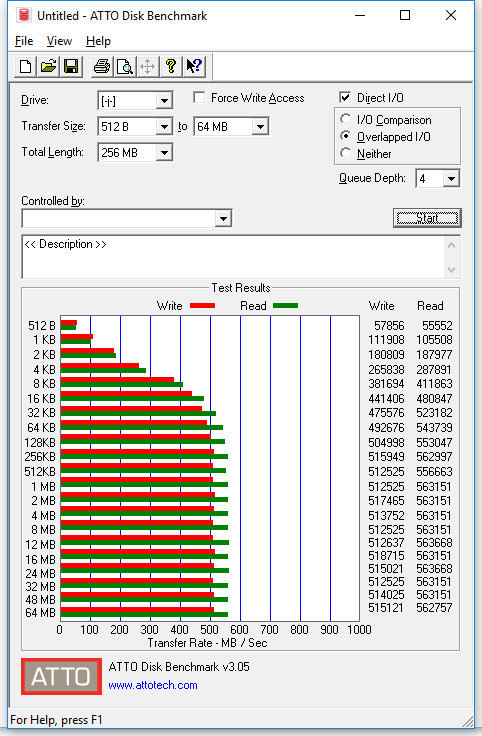ATTO Disk Benchmark is perhaps one of the oldest benchmarks going and is definitely the main staple for manufacturer performance specifications. ATTO uses RAW or compressible data and, for our benchmarks, we use a set length of 256mb and test both the read and write performance of various transfer sizes ranging from 0.5 to 8192kb. Manufacturers prefer this method of testing as it deals with raw (compressible) data rather than random (includes incompressible data) which, although more realistic, results in lower performance results.
Our fresh out of the box results in ATTO are exactly what we were expecting and comparing it to the previous 1050GB MX300, there is actually an improvement in smaller file size read results. Overall, read and write speeds exceed Crucial’s ratings of 560MB/s and 510MB/s respectively.
CRYSTAL DISK BENCHMARK VER. 6.0.0 X64
Crystal Disk Benchmark is used to measure read and write performance through a sampling of random data which is, for the most part, incompressible. Performance is virtually identical, regardless of data sample so we have included only that using random data samples.
Testing in Crystal Disk Mark shows us, again, very similar results with numbers that are similar, if not better than Crucial’s ratings. With 563/515MB/s sequential read/write speeds and 47/136MB/s 4K QD1 random read/write speeds, the Crucial MX500 delivers very good performance.
The toughest benchmark available for solid state drives is AS SSD as it relies solely on incompressible data samples when testing performance. For the most part, AS SSD tests can be considered the ‘worst case scenario’ in obtaining data transfer speeds and many enthusiasts like AS SSD for their needs. Transfer speeds are displayed on the left with IOPS results on the right.
In AS SSD, the MX500 received an overall score of 1244 points, which ranks it above the latest 3D options from WD/SanDisk. Sequential performance comes in at about 530MB/s read and 475MB/s write. Looking at the maximum IOPS, it was able to deliver 97K IOPS for read and 87K IOPS for write, similar to its rated spec of 95K/90K read/write. During the copy tests, the MX500 delivers faster performance in the ISO and Game categories but is slightly slower in the Program category. Still, all results here are very respectable for a mainstream SATA SSD.
ANVIL STORAGE UTILITIES PROFESSIONAL
Anvil’s Storage Utilities (ASU) is the most complete test bed available for the solid state drive today. The benchmark displays test results for, not only throughput but also, IOPS and Disk Access Times. Not only does it have a preset SSD benchmark, but also, it has included such things as endurance testing and threaded I/O read, write and mixed tests, all of which are very simple to understand and use in our benchmark testing.
Anvil Storage Utilities once again confirms all the performance numbers we have been seeing and overall the MX500 scored 5122 points.
 The SSD Review The Worlds Dedicated SSD Education and Review Resource |
The SSD Review The Worlds Dedicated SSD Education and Review Resource | 


Now I care more about what languages and that meaning.
Exactly
No F1 and F2-parameter? That´s disappointing